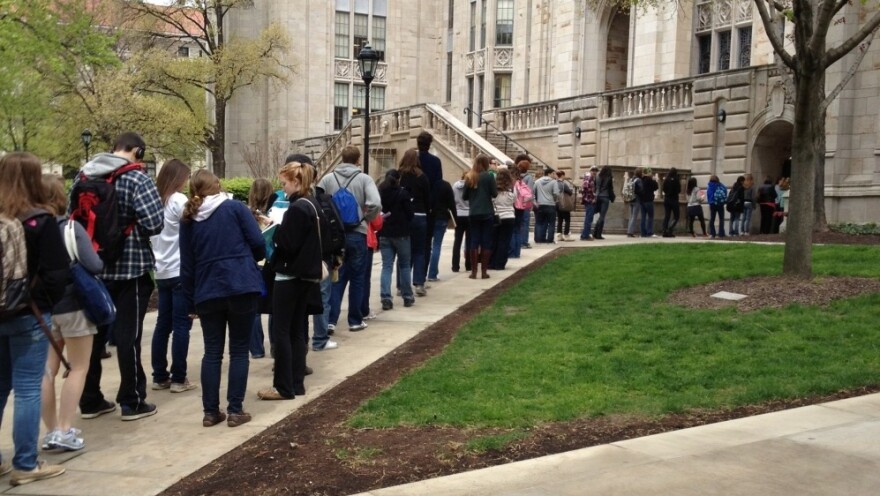Since mid-February, the University of Pittsburgh has received more than 50 bomb threats, and while they've all been false alarms, they have succeeded in disrupting campus life. Tighter security measures are now in place, but the threats continue, and students are wondering how they'll be able to make up class work and prepare for final exams.
At first, sophomore Maggie Stankaitis thought the threats were a response to the unseasonably warm weather — some prankster student trying to get out of class to enjoy the sunshine. But now, dozens of bomb threats later, and with lines of students backing up to get into the student union, class and library because of the tighter security, she's changed her mind.
"I'm like kind of waiting for it to happen, and I have like an emergency bag packed if I need to be evacuated," Stankaitis says.
Initially, bomb threats appeared scrawled in bathroom stalls in the towering building called the Cathedral of Learning, but lately they're being sent over the Internet, using a method that makes them difficult to trace. A Joint Terrorism Task Force that includes the FBI, Department of Justice and campus police is investigating, says university spokesman Robert Hill.
"We are obligated to treat every threat seriously," Hill says. "We search, we clear the building. But now, when we clear the building and make it available for occupancy, IDs are required for admission."
Around 29,000 students attend Pitt, and every threat is followed by an evacuation — whether it's the 42-story Cathedral of Learning or a dorm at 4 a.m. And Hill knows the experience is unnerving for students.
I feel that unwarranted fear just causes chaos and that that's what this person wants.
"There hasn't been a bomb," Hill says. "There hasn't been even a device detected. Still, it's unsettling to have been subjected to the threats."
Sitting outside the student union, junior David Giannaula says he's experienced a range of emotions about the threats.
"I wrote it off as someone who was getting out of a test; that was like the first two weeks, because they happened at similar times," Giannaula says. "And then I got annoyed, it was just like, 'These are fake, I'm tired of it.' And then actually probably the last two weeks, it's been a bit more nerve-wracking because it just like isn't stopping at all."
But junior Corinne Hogge thinks that fear plays right into the hands of the person, or people, making the threats.
"I feel that unwarranted fear just causes chaos, and that that's what this person wants," Hogge says.
So she's trying keep a lid on it, but as she's watched her classes canceled or interrupted, she can't help but feel ripped off.
"It's just kind of upsetting knowing that I worked an entire semester and that finals may be optional, or I may not do as well just because I didn't have the opportunity to have the class time," she says.
Lawrence Likar, a retired FBI agent and professor at La Roche College in Pittsburgh, says the university has to strike a balance as it takes into account students, academics and worried parents.
"You've got enormous pressure from their loved ones," Likar says. "And that pressure is so important to an institution — the safety of the children, altruistically, and then from a business standpoint, there's tuition money too."
The university won't discuss what's in store for finals and graduation, but a number of students say they're ready for the semester to end so they can get off campus.
Copyright 2020 90.5 WESA. To see more, visit 90.5 WESA. 9(MDAxODQzOTgwMDEyMTcyNjI4MTAxYWQyMw004))


